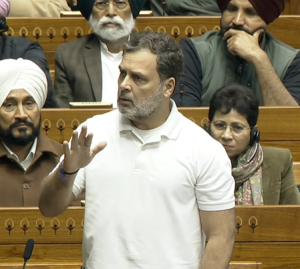A recent research shows that there were 1.19 million additional deaths in 2020, which is 8 times higher than the reported number, due to the pandemic.
Study finds 11.9 lakh excess deaths in India during COVID-19 pandemic, much higher than official numbers and WHO estimates.

In a recent international study, it was discovered that India experienced an alarming 11.9 lakh excess deaths in 2020 during the COVID-19 pandemic, which was a staggering 17% increase compared to the previous year. This estimate is a shocking eight times higher than the official COVID-19 death toll reported by India, and 1.5 times higher than the World Health Organization's estimates. The study, conducted by researchers from the University of Oxford in the UK, used data from over 7.65 lakh individuals and focused on changes in life expectancy at birth, broken down by gender and social group.
India has been one of the hardest-hit countries during the pandemic, with approximately one-third of global excess deaths being reported here. The data for this study was gathered from the National Family Health Survey-5. The results showed a decline in life expectancy among women by 3.1 years and among men by 2.1 years. The authors of the study suggested that this could be attributed to gender inequalities in healthcare and resource distribution within households.
Interestingly, these findings are in contrast to those seen in high-income countries, where excess deaths were higher among men than women during the pandemic. The study, published in the journal Science Advances, also looked at the impact of the pandemic on different social groups in India. It was found that high-caste Hindu groups experienced a decline in life expectancy of 1.3 years, while Muslims and Scheduled Tribes saw a much larger decrease of 5.4 years and 4.1 years, respectively.
According to the authors, the pandemic has only worsened the existing disparities faced by these marginalised groups in terms of life expectancy. Aashish Gupta, the first author of the study and a research fellow at the University of Oxford, stated that "marginalised groups already had lower life expectancy, and the pandemic further increased the gap between the most privileged Indian social groups and the most marginalised."
The study also revealed that excess deaths occurred across all age groups, with the most significant increase seen among the youngest and oldest age groups. In comparison, high-income countries primarily saw a rise in deaths among those aged 60 and above. The authors suggested that this could be due to children in certain areas being more vulnerable to COVID-19 and the indirect effects of the pandemic, such as economic hardships and disruptions to public health services.
Ridhi Kashyap, a professor at the University of Oxford, highlighted the importance of addressing inequality when looking at mortality rates. She stated, "our study shows that pandemics can worsen existing disparities instead of bridging them." Kashyap also pointed out the impact of COVID-19 on gender disparities, saying that it "further exacerbated the health impacts of pre-pandemic gender disparities."
However, the Ministry of Health and Family Welfare has disputed the study's findings, calling them "gross and misleading." In a statement issued in response to the study, the Ministry stated that the methodology used in the study had "critical flaws." They argued that the data used was not representative of the entire country and that the study failed to acknowledge the robust Civil Registration System in India, which recorded a significant increase in death registrations in 2020.
Despite the Ministry's objections, the study sheds light on the devastating effects of the pandemic on India's population, particularly on marginalised groups. It serves as a reminder of the importance of addressing inequalities in healthcare and resource distribution, both during and after a crisis like the COVID-19 pandemic.










